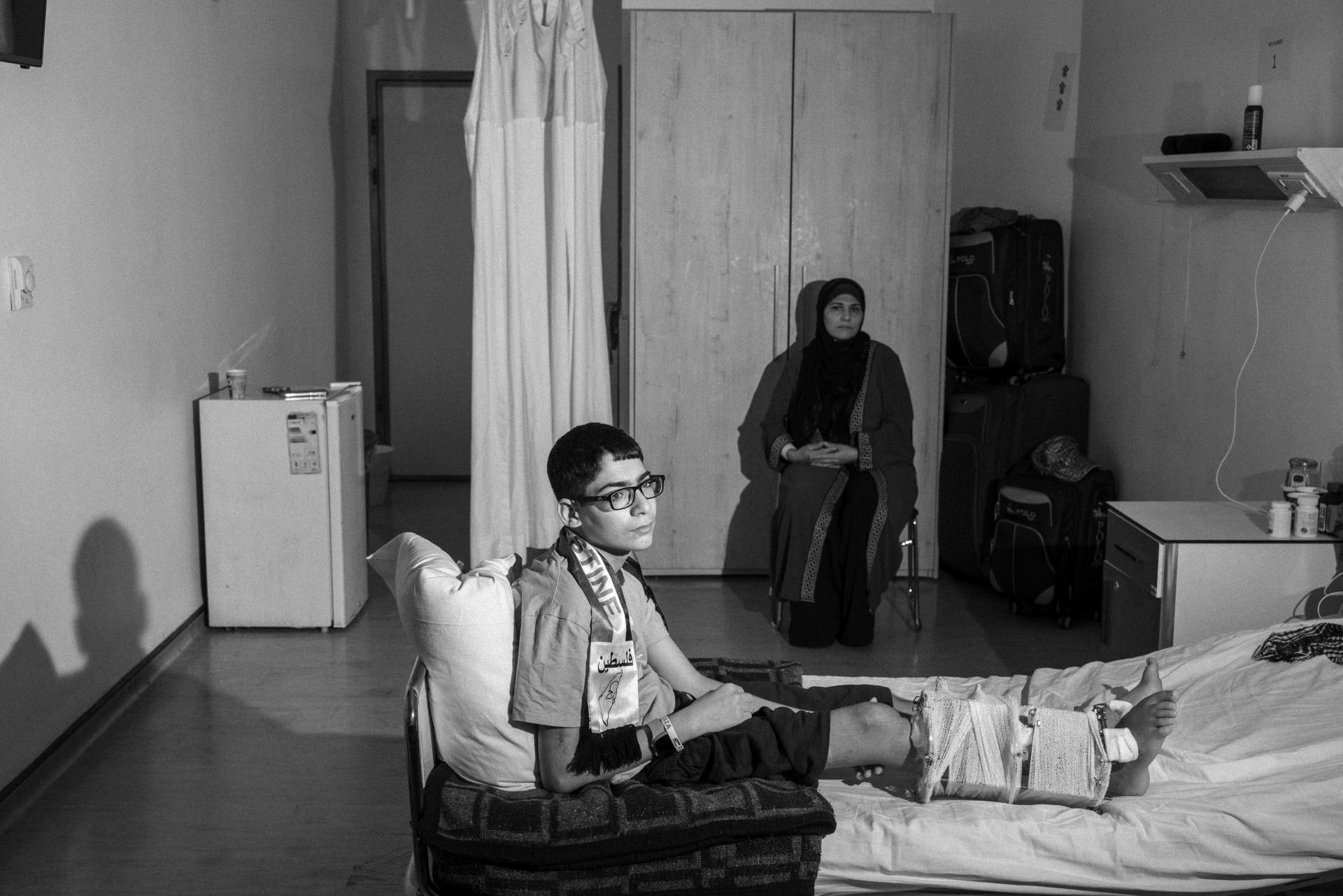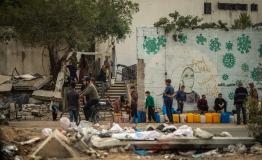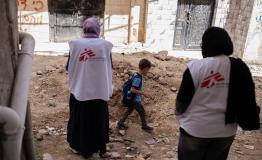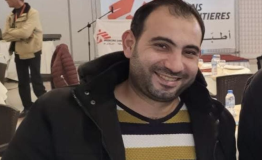After nearly one year of relentless Israeli attacks across the Gaza Strip, almost 41,000 people have been killed. In addition, another 95,000 people have been injured, at least 14,000 of whom are in need of medical evacuation, according to the World Health Organization.
MSF calls on the Israeli authorities to ensure medical evacuations for Palestinians in need of specialised medical care, including their caregivers, and for other states to receive and facilitate treatment outside of Gaza, while ensuring that all patients and their caregivers are guaranteed safe, voluntary and dignified return to Gaza.
At the Medecins Sans Frontieres (MSF) reconstructive surgery in Amman, Jordan, our teams are treating the few Gazan children we have managed to transfer for rehabilitation after they were medically evacuated to Egypt – a tiny fragment of the thousands of people in need of specialised medical care across the Gaza Strip.
Abdul Rahman was critically injured on 10 February 2024, after an Israeli airstrike targeted him and his friends in northern Gaza while they were out looking for food. Abdul Rahman, 15, nearly lost his leg in the attack. After receiving emergency surgery in Gaza, he was medically evacuated to Egypt, and then to the MSF hospital in Amman.
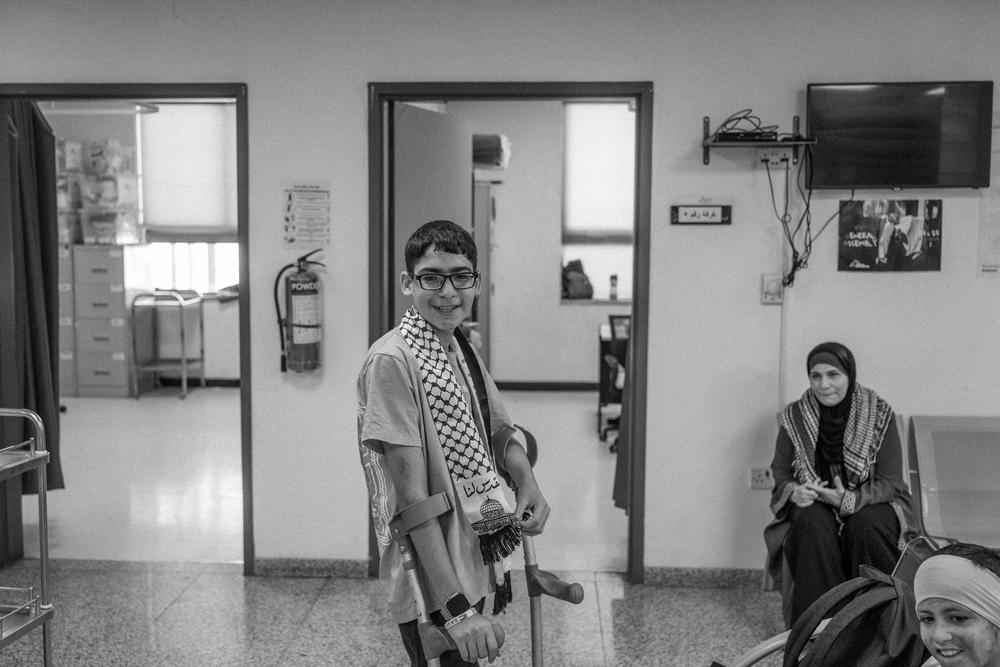
There, he is receiving comprehensive surgery accompanied with daily physiotherapy and mental health support. Seven months since the attack, Abdul Rahman reflects on his incredible journey of recovery, while many other children like him remain in limbo awaiting evacuation.
“That day, my mum was asleep, so I went out with my backpack to try and sell sesame to get money for food with my cousin and a friend. After a while, we went outside our area where the Israeli military had been, because often they leave food behind after they leave. I wanted to surprise my mum with some salt or some flour.
We were searching in some houses on Al-Rashid street, next to the sea, when we saw that there were Israeli soldiers, so we started running away. I was in the middle, my cousin and friend where on either side of me. Then we heard the buzzing of a drone above us. Suddenly I felt like I was spinning and I couldn’t see anything. When I regained consciousness, my cousin was dragging me to the side of the road. He said, ‘If we stay here, we will all die.’ He tied something around my leg and then he ran away.
I started crawling towards the sidewalk and I could still hear missiles dropping near me. I was crawling for about an hour. I remember there were dogs surrounding me. I kept screaming for help, and then fainting, until at some point a young man showed up. He picked me up and carried me on his shoulder. I remember he sometimes dropped me to rest, and then picked me back up again and continued walking. After a while, he put me on some wood, and with the help of other men they carried me all the way to the Jordanian hospital in Gaza.”
When Abdul Rahman arrived to the Jordanian hospital, medics feared they would need to amputate his leg. He was transferred to the Baptist hospital where surgeons performed emergency surgery and managed to save his leg. Due to the lack of medical supplies in Gaza, surgeons had to perform the operations without anaesthesia.
They would rub iodine inside the wound to stop it getting infected. It was torture. After three weeks, they transferred me to Al-Shifa hospital, as the Israelis were dropping bombs near the Baptist hospital and it was no longer safeAbdul Rahman
We stayed at Al-Shifa for two months. There were massacres every day. However, when the Israelis raided the hospital in March we had to flee. There were no cars, so we had to travel to the south on donkeys. Whenever we saw Israelis they intimidated us, forcing us to raise our hands and get off the donkeys.”
When Abdul Rahman and his family arrived in the south, he was admitted to Yousef Al-Najar hospital in Rafah. After one week, he and his mother were granted permission for medical evacuation to a hospital in Cairo, Egypt, before being transferred to the MSF hospital in Amman, Jordan, a few months later. At the MSF hospital, Abdul Rahman has undergone surgery for to modify the external fixator on his right leg, as well as daily physiotherapy to encourage the healing of his bone.
“Before arriving here, I was only able to move with a wheelchair, but now I can walk with crutches. With the physiotherapy, I’m getting a bit better every day.
We want to go back to Gaza once it is rebuilt, but all of our buildings and homes have been destroyed. I just want to be reunited with my siblings and my father who are still in Gaza. I always dream about them.
When I get older, I hope to become a surgeon, because they have helped me a lot, so now I want to help other people.”
While at least 14,000 people in Gaza are in need of medical evacuation, the case approval rate for medical evacuations is only 41 per cent, according to the World Health Organization. Part of the obstacle in getting people with medical needs out of Gaza lies with the Israeli authorities, who are arbitrarily denying medical evacuations for children and their caretakers, according to MSF.
